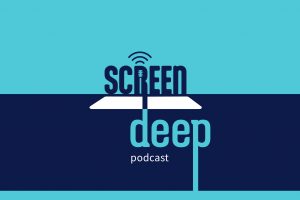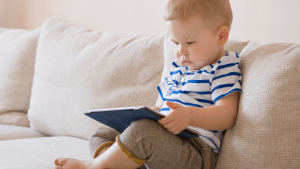On this inaugural episode of Screen Deep, host Kris Perry interviews Dimitri Christakis, MD, MPH, about his decades of experience investigating the impact of screens in early childhood from baby videos to tablet apps. Drawing on his experience as a leading researcher, pediatrician, and parent, Dimitri shares both historical and recent findings on screen use among very young children, particularly its possible uses for early learning and its relationship to cognitive and language development. He emphasizes the importance of caregiver-child interactions, and the risk that digital media can displace this important facet of development. He also suggests that more can be done to hold companies accountable and make it easier for parents to make decisions about what media to choose for their children.
Listen on Platforms
About Dimitri Christakis
 Dimitri Christakis, MD, MPH, is the Principal Investigator at the Center for Child Health in the Brain and Development department at Seattle Children’s Research Institute, as well as the George Adkins Professor of Pediatrics at the University of Washington, and the Chief Health Officer at Special Olympics International.Additionally, Dr. Christakis serves as the editor in Chief of JAMA Pediatrics and Chief Science Officer at Children and Screens. He has devoted his career to investigating how early experiences impact children and to helping parents improve their children’s early learning environments. He and his colleagues in the Christakis Lab have made a number of landmark findings, including discovering that young children who watch TV are more likely to develop attention problems and other health and behavioral issues. He is the author of more than 170 original research articles, a textbook of pediatrics, and co-author of the groundbreaking book, The Elephant in the Living Room: Make Television Work for Your Kids. He has appeared on CNN, NPR, Today, CBS News, ABC News, NBC News and was recently featured as a TEDx speaker. He is a graduate of Yale University, the University of Pennsylvania school of Medicine, and the University of Washington School of Public Health.
Dimitri Christakis, MD, MPH, is the Principal Investigator at the Center for Child Health in the Brain and Development department at Seattle Children’s Research Institute, as well as the George Adkins Professor of Pediatrics at the University of Washington, and the Chief Health Officer at Special Olympics International.Additionally, Dr. Christakis serves as the editor in Chief of JAMA Pediatrics and Chief Science Officer at Children and Screens. He has devoted his career to investigating how early experiences impact children and to helping parents improve their children’s early learning environments. He and his colleagues in the Christakis Lab have made a number of landmark findings, including discovering that young children who watch TV are more likely to develop attention problems and other health and behavioral issues. He is the author of more than 170 original research articles, a textbook of pediatrics, and co-author of the groundbreaking book, The Elephant in the Living Room: Make Television Work for Your Kids. He has appeared on CNN, NPR, Today, CBS News, ABC News, NBC News and was recently featured as a TEDx speaker. He is a graduate of Yale University, the University of Pennsylvania school of Medicine, and the University of Washington School of Public Health.
In this episode, you’ll learn:
- How brains develop in early childhood and what the research says on media use for infants under 18 months.
- Why introducing “learning” technology in early childhood may negatively affect cognitive and language development.
- The importance of “joint attention” in infant development – and why caregiver interaction is crucial during this time.
- How engaging apps make it more difficult to command young children’s attention.
[Kris Perry]: Hello and welcome to the Screen Deep podcast where we go on deep dives with experts in the field to decode young brains and behavior in a digital world. I’m Kris Perry, Executive Director of Children and Screens and the host of Screen Deep. Today for our very first episode of Screen Deep, I welcome Dr. Dimitri Christakis. And get ready for his vast experience because Dimitri is not only a pediatrician at Seattle Children’s Hospital, but also the former director and current principal investigator at the Center for Child Health, Behavior and Development, Seattle Children’s Research Institute. He’s a professor in the School of Medicine at University of Washington, the Chief Health Officer of Special Olympics International, and the Editor in Chief of the journal JAMA Pediatrics. On top of all of that, I am proud to say that Dimitri is also the Chief Science Officer of Children and Screens. Dimitri has been a true leader and trailblazer in the field of digital media’s impacts on child development, particularly young children, for decades, has published so much seminal research and devoted himself to the cause of child health. I can’t wait to learn more from him here today. Welcome, Dimitri.
[Dr. Dimitri Christakis]: Thank you. It’s a pleasure to be here, especially on the inaugural podcast. This is quite an honor for me.
[Kris Perry]: To get us started, I’m going to ask you this question, and I plan to ask all of our other guests this question on the podcast. How much time do you spend on screens every day? And do you feel like you’re spending too much time on screens?
[Dr. Dimitri Christakis]: You know, so, I’ll give you my answer and then I’ll check my screen time on my phone, which is where I spend, actually I won’t give you an accurate estimate because I spend a lot of time in front of a computer. But if you asked me how much time I spend on screens, all time, right? Not just recreational time, all time, a day? I would say, I would say between eight and 10 hours.
Yes, I’m on my screens for a long time. And then you said, do I spend too much time? I would say the answer to that is yes, but the more nuanced answer is not the 10 hours per day, because I could tell you that I’m working in front of a screen for 10 hours a day. It would be how much of that time could have been better spent. And I think that’s really the salient question for all of us. And there I would say a good fraction of it could be better spent.
[Kris Perry]: I really empathize and, at the same time, worry about all of our screen time. It’s really one of the major inspirations for this podcast.
We’re going to take a deep dive now into you and your background and how is it exactly? Let’s start here. How did you come to do what you do, most particularly around children’s health?
[Dr. Dimitri Christakis]: Yeah. Well, I mean, my journey is too long and boring for your listeners, but the truth is, you know, my interest, I was a child health researcher for a while, and, let’s see now, 27 years ago, I became a father and spent the third month of my son’s life at home on paternity leave. And I timed it perfectly as a pediatrician because his colic was crescendoing right when I started taking over when my wife went back to work at two-months. And I was bouncing up and down on a ball with him in a BabyBjörn, I think it was called in the day, up against me and watching screens, daytime TV to try to keep my sanity. And I noticed that he was interested in the screen as well and was curious what the effects of screen time on him would be, why he was even interested in it as a two-month-old. And you know, over time, I came to study early childhood mostly because I was curious how I could be a better parent. And so I started to focus my research on early child influences, and it’s pretty hard to think about environmental influences on children’s lives, children of any age, by the way, but I was particularly interested in young children, and not think about screen time. You know, when you look at young children’s screen time, as I did early in my career, what we found is that for preschool children, they spent about 50%, 30 to 50% of their waking hours in front of a screen. And that research predated iPads and iPhones. So, it’s a very prevalent and pervasive influence. And let’s, let’s frame it that way so we could talk about it you know, with positive and negative valence. It’s the elephant in the room. It’s what people spend a lot of time on. And for young children in particular who are on a very rapid developmental trajectory, everything they do, everything they see, every interaction they have impacts not just their development, but the architecture of their brains.
[Kris Perry]: So 27 years researching, you’re a parent, you’ve been thinking about this for decades. How do you think media has changed childhood in that time? And then, you know, what makes for a healthy childhood, given all that you know from being a clinician and a researcher and a father?
[Dr. Dimitri Christakis]: I think it’s had a profound impact. I mean, to say the least, that’s almost banal at this point. And it’s impacted it bi-directionally. I mean, I think it’s impacted children’s experience with the world because they spend a lot of time on screens. And by the way, I started my research, as I alluded to, before touchscreens, which were a real game changer for all of us, and especially for young children. I started researching television, and DVDs were the predominant medium then. Parents would buy DVDs to show their children. And it’s affected parenting because, you know, the phenomenon of distracted parenting or technoference. So it’s – it’s altered the landscape of early childhood, both because of the way it directs children’s attention and because of the way it redirects parents’ attention, oftentimes away from their child. That sounds very dire and negative, but I think it’s important to appreciate that reality. And you’re going to be talking to people about media, I imagine, through the entire lifespan, at least through the lifespan of children. But for young children, I think it has to be recognized that it’s – it’s a fundamentally different experience, and it has, I think, different implications that need to be appreciated in their developmental context.
[Kris Perry]: Well, thank you for touching on some of those fundamental changes to childhood and frankly to children – as media changes so does childhood. We’re gonna dig deeper now into your study of media and children. And I wanna just ask, when you started this process, when you started researching this, was anybody else doing this? And – what was the level of concern that you had as you started your research and started to see what some of these impacts were?
[Dr. Dimitri Christakis]: Look, I don’t wanna be self-aggrandizing. I was not the first or the only person to study it. In fact, as people say, I stood on the shoulders of giants. There were people doing research on children and television. There have been actually since the advent of the media in the 1950s, but there weren’t very many – there weren’t very many doing it. And the research, if you will, was in its infancy because it was based on television, which now seems like an archaic medium, quite frankly, when you think about the landscape of media in early childhood. I was amongst the first to look at the effects of what was then a game changer, which was Baby Einstein. So the early days of childhood television started actually with Sesame Street and people like Dan Anderson were researching it and its effects and frankly, that programming was research-based and has been shown to have some positive influences on early childhood experiences. But it was designed for children over the age of three. Baby Einstein came along and was sort of the pioneer, if you will, in infant TV viewing. And we studied the effect of Baby Einstein early on and found that it was associated with delayed language acquisition. Others have subsequently replicated those findings to some extent. We also found that early exposure to fast-paced programming shortens children’s attention spans. This is infancy. These are children under the age of two in both cases.
So, you know, again, when we talk about early childhood and media, we need to ask the question, what age, what media, how much? So, and all of that research predated iPhones, as I mentioned, which were game changers because of their interactive nature, the contingent response. You know, it’s interesting because we’ve known for a very long time that contingent responses drive engagement. So those of our listeners who are old enough to remember, Sesame Street knew that, Mr. Rogers knew that, they would ask questions of children because they knew that asking questions would make the children attend to the screen and the children would answer the question and then invariably the answer was, “That’s right!” But of course, it wasn’t always right. It may not even have been an answer at all, but that contingent response, the sense that the child was answering the question and being – and that answer was being acknowledged, drove engagement. And that’s the kind of interactivity that is fundamentally built-in, structurally, to touchscreens. And that’s what makes them especially alluring. It can be used in a very positive way, but it can be used deliberately or unconsciously to command attention.
[Kris Perry]: So I think you know, I think we became parents around the same time. And…
[Dr. Dimitri Christakis]: We did. I’m a little older than you, I think, by a couple of months.
[Kris Perry]: I don’t think so, I don’t think so. And I’ve been passionate about early childhood development for forever. It seems like forever. So I’m really interested in this early research that you conducted. I remember Baby Einstein. I remember DVDs. I remember feeling that, you know, it would be important to do everything I could to help my children reach their greatest potential. And if there was a product out there that was – that could accelerate that progress, well, I was gonna go get that product. And I think it’s so profound that you as a researcher dug in to find out – was there actually merit behind this marketing campaign to parents to use a DVD to make their children, in quotes, “smarter?” And I want to talk a little bit about that, that contingency that you talked about, which is a feature of these really important dyadic relationships that occur between parents and children. And it seems like maybe television and children. And a little bit about how what I think of as “serve and return”: when I give my child a verbal cue and then they respond with a verbal cue or vice versa, we’re in a “serve and return” and the television can even perform, I guess, a little bit of that function. Tell me a little bit about what you did in your research way back, I guess, around 2007 that helped you uncover this viewing behavior by children and whether or not Baby Einstein was accelerating or perhaps even slowing down the very developmental stage that parents were hoping to improve. Like, tell us more about those findings and were you, did you talk to parents? Did you observe parents? How did you do this?
[Dr. Dimitri Christakis]: So a lot to say on what you just said, Kris. First of all, you’re right that it’s a primordial and very healthy desire, let’s even say instinct, of parents to try to optimize their children’s cognitive, social, emotional, financial development. And we are, as a result, prone, vulnerable even, to products, services that promise to help in that regard. And I think that’s exactly what made Baby Einstein the phenomenon it was. It sold itself to parents who grew up on Sesame Street, who had come to believe that television – there was educational television, right? The Educational Television Workshop was what put together Sesame Street. And so they were right to buy it. It’s interesting though, because the DVDs were expensive, and the truth is it was higher SES parents who invested in the DVDs. And this is one of the few areas where having extra resources actually may have done your children a disservice. But putting that aside, we, in those early days, did a study where we surveyed parents and asked them how much time their children, what age they started watching television. It turned out back then, and this was before, again, this was before apps, this was in 2007. It was about age four-months. So the typical child in United States started watching screens at four-months. And at four-months, they watched for about two hours a day, and it went up from there. And we asked if they watched Baby Einstein and then how many hours a day. And then we did a language assessment. So, there’s something called the MacArthur-Bates where parents are asked words and asked if their children recognized them, because young children have receptive language, but not vocal language, very limited vocal language. And we found that there was an association between the amount of hours they spent watching Baby Einstein in particular and the number of words they knew. And, you know, it’s an association. It doesn’t prove causality. We didn’t randomize children to watch Baby Einstein or not, but it’s grounded in a very, as you said, a very fundamental experience of childhood, this sort of serve and return, this back and forth. We know that children, we’ve known for millennia that children learn best in exchanges with caregivers. And in fact, young children are wired to do that.
So there’s something called joint attention, which you alluded to, which is that a young child and a parent will focus on something. In fact, if a parent points to something, an infant will fix its gaze on it and then reflexively bring its gaze back to the parent, implicitly saying, asking, “What is that? Tell me something about it.” And the parent will say something. “That’s an orange.” “That’s a lion.” When children get to be about 10 to 12 months of age, they’ll initiate dyadic attention. So they’ll point to something. A parent will look and look back. This happens all the time– tens, hundreds of times a day when most people aren’t even aware of it. It’s not just how children learn language, it’s how they learn – it’s how they build social-emotional intelligence and how they come to appreciate a caregiver’s attention, affection. It’s how they learn to love and rely on other people. So in the early days, we found that association and the mechanism potential was that it was displacing those opportunities for parents and children to interact with one another.
More recently, and this study was just published maybe three months ago, we brought kids into the lab and had them interact with caregivers with or without highly interactive screens that had that contingent response that would prompt children to touch things and get reactions or not get reactions or get predictable or unpredictable reactions. And at a very fixed predetermined point, one of my research assistants would try to get the child’s attention, just as we described, would say, look, and see if the child would look. And we did this across conditions with a regular toy, with an electronic toy, and then with one of these highly engaging apps, and found that actually children’s attention was much more difficult to command when they were playing with one of those highly engaging apps. So connecting that study with the study we did 25 years ago with what was then passive viewing, what we’re finding is that media have the potential, the very real potential, to interrupt that serve and return, to diminish those opportunities. And those opportunities, as we talked about, are so essential to all aspects of child development.
[Kris Perry]: Thank you for connecting that recent study with your work from decades ago and–
[Dr. Dimitri Christakis]: You make me sound so old! Go ahead.
[Kris Perry]: And how even different research findings helps us deepen our understanding of child development as there are new inventions, like whether it’s television or a tablet that has a touchscreen. And it brings up for me something of concern, and I think to parents too, which is, we do have these altruistic intentions with our children of helping them achieve their greatest potential. And if someone tells us that their product will do that, we want to believe them. But I think you made a really important point about public television and its public good. It’s charged to create a public good versus perhaps a product from a company, a for-profit corporation that’s looking to increase its profits. And it’s important for parents to know sort of who’s behind these products, what are they ultimately trying to accomplish with that, that might not be totally aligned with what the parent’s trying to accomplish. And the research really helps us make better choices as parents as we are confronted with these different products over time. So thank you for making that connection across the different steps.
[Dr. Dimitri Christakis]: You’re welcome, well, let’s drill down on that a little bit, Kris, because I think what you said is really important and speaks a lot to the way we, the public health approaches we take to early childhood, childhood in general. If you look at apps in the early childhood space, as we’ve done, they’re all labeled as educational. There isn’t actually a, there isn’t a gaming category in apps for young children. Now why is that? Well, there are lots of possible reasons, but the truth is for someone to put something in the educational category, it doesn’t seem like it’s a stretch that the onus should be on them to prove that it is educational, right? I mean, it’s hard to measure fun and we don’t need metrics for it. I mean, as a parent, I can look at a child on a playground and tell you they’re having a good time, but it’s easy to measure learning and we do it all the time. So if I want to tell you that this app is educational, I think it’s very reasonable as a society that we say, “Prove it.” Prove that playing this game, because I don’t want to single anyone out, teaches letters, teaches numbers, teaches prosocial, or don’t label it that way, you know? Most parents now feel like they can look at labels for foods to determine if they’re healthy for their young children or least they should. They can look at the nutrient profile, macro and micro. They can’t for apps or for programs. I mean, again, they can look at the labels such as they are, but the labels aren’t accurate in any way, shape or form, and they could be. You know, it would be very easy and it would take essentially, you know, I presume an act of Congress or maybe the Federal Trade Commission could do it on its own. I don’t really know how regulations work. But simply to say, the same way you can’t label something organic unless you meet certain criteria. You can’t label a program or an app educational unless you do X, Y, or Z. You can still sell it. You can market it as a game. You just can’t label it as educational. Why can’t we do that? Why isn’t there and whose interest does that serve? I don’t think any parent would object to somebody requiring that a commercial entity prove that something is safe and effective. By the way, we do it with pharmaceuticals too. I mean, there’s so many examples where we do that. And yet in the space of apps, particularly apps for young children, we don’t do it at all. We just give industry a pass.
[Kris Perry]: Is there consensus on the use of the word “educational products”, such as Baby Einstein or some of the descendants of that product? Is there consensus among researchers? I hear you loud and clear that there hasn’t necessarily been consensus at the policy level or the regulation level. But among researchers, is there consensus that this is an important step?
[Dr. Dimitri Christakis]: Yeah. Well, look, yeah, I mean, as recently, look, I don’t know that there’s consensus or not. I think we could achieve it fairly quickly. I mean, there’s, we’ve developed metrics around kindergarten readiness, around numeracy, around literacy. I mean, these exist. We use those tools all the time in other arenas. We just don’t apply them, for apps. I mean the developers of those aren’t put to task for that. Baby Einstein, apart from the fact that the name itself suggests it turns kids into geniuses, and we know what geniuses are, it’s an IQ cutoff, so there’s a simple test. If you wanna sell this as a product that makes your child a genius, prove that it moves their IQ to above 140. But if you say, you know, as they used to say, “teaches your child numbers”, or “teaches your child to love music” – demonstrate it. Yes, we can do that. So I think there essentially, there may not be consensus about what constitutes “educational”, but there’s consensus about whether or not a significant improvement was made in literacy, numeracy, even prosocial behaviors. We have measures of all of these things and they could easily be applied.
[Kris Perry]: So, you know, we’ve touched on contingencies, serve and return, expressive language, receptive language, language development. And you and I both know that before DVDs and before apps, children were acquiring language and becoming fluent in a language or more than one language for millennia. And it is deeply embedded in a loving relationship with a caregiver. And now we’re confronted with different products that are telling us that maybe there’s a shortcut, you know, maybe there’s a way to speed this up. And so before we leave this topic, just want to know, is it always bad to go to a screen or an app or a game to help with early language development? I mean, are there uses of technology or screens that might aid early language development?
[Dr. Dimitri Christakis]: It’s an excellent question. And so let me try to break it down simply. I think under the age of 18 months, there’s really no evidence yet that that screens can play a positive development role in children’s language acquisition or their cognitive development in general. I think as they get older, that changes. We talked earlier about preschool children and Sesame Street and other educational programs, I’m dating myself by singling out Sesame Street, that have been shown to improve not just language and numeracy, but prosocial skills. Some of the best Sesame Street episodes successfully demonstrated that they promoted tolerance in the old days, racial tolerance, and now hopefully as well, neurodiversity and, and gender tolerance. So, there’s a lot of evidence that children imitate behaviors on screen, positive and negative, that goes back for a long time. But you mentioned specifically the serve and return aspect of early childhood. And I want to stick to evidence because we talked about what can I say that’s been studied. The only example that I know of of an app that has been proven in a very robust way to be educational is an app called “Bedtime Math”. And full disclosure, I have no financial relationship with “Bedtime Math” at all. It’s a free publicly-available app. What it is is an app that you download to your device and it gives you a very simple story, one screen story that has some numbers embedded in it. And at the end of that story, you can choose easy, medium, or hard. I think it’s actually, the words are different, but that’s essentially what it translates to, and you click on that and it gives you a question, which is basically a math question based on the story you just read. And “Bedtime Math” was studied in first graders in Chicago schools in a very robust way. So schools, classrooms were randomized to “Bedtime Math” or bedtime reading and followed over the course of a year. And what they found was that the children in the “Bedtime Math” group scored higher in math scores, so back to like metrics that we use, reliable metrics that we use to measure learning in first grade children, compared to children in the bedtime reading group. So for the people who are experimentalists, this is a very robust design with a very good control group. And the differences were bigger for parents who self-reported at baseline that they were “math anxious,” which also makes sense, because those parents that are math anxious are less likely, are likely to be less likely to do math with their kids. So there’s an example of an app that actually demonstrated educational value for first graders, not for infants. Probably could work for kids a little bit younger than that, especially because kids develop at different rates. But I want to drill down for a minute on what that app is. That’s not an app that a parent gave to a first grader and walked away. It’s an app that a parent did with their child that essentially queued up what Vygotsky called a “scaffolding opportunity”, what you’re calling “serve and return”. Laid – set the table for a parent to have that meaningful interaction with their child and cement math learning. To me, that’s the sweet spot in early childhood, is developing apps or programs, by the way, because we know that even early educational programs, their value was augmented when a parent co-watched with their child. That’s the sweet spot, you know, is finding ways to promote human interaction. Now I should be clear, you don’t really need an app for that. You know, I don’t want to oversell it. I mean, you know, a parent can do bedtime math with their child just with a book, or without a book, you know, with a toy or with nothing at all. I mean, they don’t need an app for that. But it brings it back to the fact that there’s no substitute in early childhood for human interaction. As I frequently say, you know, “young children need laps more than apps.”
[Kris Perry]: Hmm. I mean, it is a little bit of a slippery slope. If there is a product out there that does, you know, encourage parental engagement with the child, co-viewing, scaffolding, it’s great. That’s a sweet spot. But you also maybe even start this process of the child becoming interested in technology at a very young age. You know, and potential consequences down the road, as you pointed out, children at very young ages are on screens many, many hours per day. So you know, talk a little bit about those – that heavy use scenario so that parents are cautious if they’re going to engage with or, you know, hand their child a tablet or another kind of touchscreen device that might have an educational product on it. That that might be good, but you’re also taking on these additional risks. So talk a little bit about heavy use, tablet use.
[Dr. Dimitri Christakis]: Yeah, yeah. So, you know, first of all, you’re right that, you know, one could worry that the existence of educational apps might drive usage. I worry less about that these days because, honestly, we’re already saturating early childhood experience. It’s almost about harm reduction now. I always try to tell parents like, look, minimize screen time in early childhood, but also be selective, you know? And so like an hour spent on app A is not the same as spent on app B. So choose app B, but still keep it to a minimum. You know, we often use the metaphor of a “media diet” and I think it’s an apt one because even healthy foods have their limits. So, you know, we could agree that carrots are a healthy food, but if you eat a bushel of carrots a day, it’s not a healthy diet because you’re almost certainly not taking in other essential nutrients. So, you know, even the “Bedtime Math” example, you know, which is, as I said, as apps go, it’s a good one. It’s time well spent, relatively speaking. But it wouldn’t be well spent if you spent four hours a day on it or even three hours a day. The phenomenon of what I call “displacement” is also essential. You know, there’s even good things have their limits.
The research we’re doing now in the lab is really focused, as I alluded to before, on the age at which compulsive media use starts. And my contention is that it starts in early childhood, it starts in infancy, because young children develop dependencies on screens, and those dependencies only deepen with time. So, you know, we try to instill in our young children a healthy diet around food choices, and we should do the same around their media choices and media usage.
[Kris Perry]: You’ve talked a lot about early childhood as a very sensitive developmental period and the interaction with all of this media. Can you just highlight for our listeners why that early childhood developmental period is so sensitive? Why these dependencies could take hold?
[Dr. Dimitri Christakis]:. Well, you know, we’ve known for a long time that we’re born with our brains not fully developed. In fact, the newborn brain triples in size in the first two years of life. And importantly, it grows in direct response to external stimuli. So in some ways, we evolve so that our mind can fine tune itself to the world that we inhabit. I mean, we distinguish ourselves even from our closest primate relatives in having a prolonged period of dependency on our caregivers. Most mammals are born pretty close to being able to fend for themselves and are very quickly, even though they’re dependent often on their mother for nourishment, are essentially launched and “sink or swim” within the first couple years of life. We don’t do that with our babies, with our children, for a lot of evolutionary reasons. But one of the essential attributes of that is that those early experiences are essential to brain development. So we often think of it in terms of like a nurturing relationship. But if you look at the wiring of the mind, in any number of ways, what you see is that it undergoes profound architectural changes early in life. And if you look at sort of the most egregious examples, children who were born in profoundly neglected early childhood experiences – So the most salient examples of these are the studies that were done on Romanian orphans who were essentially raised in vacuo, they were put into closets and neglected completely. There are areas of the brain that didn’t develop at all, that completely atrophied. So those early experiences are essential to child development. When you look at a baby, they spend an enormous amount of their mental energy trying to figure out the rules of the world they’ve come to inhabit, right? They’re born without any understanding of them. And for me, one of the most, I don’t know, entertaining, enriching things when I look at a baby now as, I guess, as an aspiring grandparent, but as a perennial pediatrician and lover of young children, is to look at their eyes and look at them staring and to know that they are intently trying to figure out causality. “What’s happening? How do I make sense of this world?” And we introduce screens into all of that. And I just think we have to be very cognizant of that, of both what those screens are doing and what they’re displacing, whether it’s live interaction with the human or whether it’s interacting with the world in a three-dimensional real way. As parents, we talk about it as a magical period in child development. But the truth is, it’s a scientific, developmentally, neurologically amazing one. Truly amazing.
[Kris Perry]: Profoundly magical. And it’s probably why new parents are sort of notoriously anxious and worried about doing the very best thing they can for their infants and their young children. And now we know there is just so much information out there that new parents are bombarded with that helps them or one– gets them to think about the optimal health of their child and their parenting skills and what tools they should be giving their children so that they’re successful in the world. It can all be really overwhelming. So after all the work you’ve done these past many decades in child health, what is the single most important thing you think parents should know about media use and young children? And even broader than that, what are the most important basic practices you think parents should put in place to help their children live healthy lives?
[Dr. Dimitri Christakis]: Well, I mean, what I’ll say, as I often do, is that parents should recognize and appreciate the fact that they are their children’s first and most important teacher. And there’s no substitute for that. And I say parents, I should really say caregivers. It’s an incredibly difficult job that is unappreciated for its importance. And it can be exhausting. I remember those days very, very well. And as I said at the beginning of this podcast, it’s what drove me to focus my research on early childhood. It was my own anxiety about what I was not doing that I should be doing or what I was doing that I shouldn’t be doing. It’s a very real, profound driver for parents. And it’s often something that they feel guilty about. I don’t think guilt is a constructive emotion in this context, but I do think appreciating your own importance and the role that you play in your children’s lives is essential and screens are no substitute for that. They can be essential in the sense that they give you a break so that you can be your best parent, your best self to your children, but that’s different.
[Kris Perry]: Thank you so much, Dimitri, for coming in and sharing just a piece of your expertise and wisdom with us today on Screen Deep. And thank you to our listeners for joining us today. This is just the first episode of many where we take a deep dive into how various forms of media from social media, video games, online content, and digital technology affect the maternal, mental, emotional, and behavioral development of children.If you’re interested in more information and resources about parenting, child development, and healthy digital media use, head over to our website at childrenandscreens.org and check out our Learn and Explore Resource Library online for the latest research and advice on pressing topics facing children and families in the digital age. Have a topic or expert in the field you’d like to hear from? Drop us a comment or reach out on social media. Don’t forget to stay tuned for upcoming webinars, cutting edge research, and new resources as they come out. Until next time, keep exploring and learning with us.






